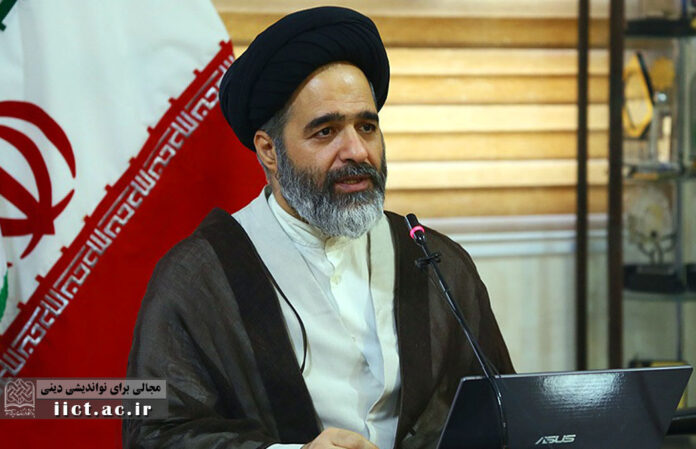According to the Public Relations Office of the Research Institute for Islamic Culture and Thought, quoting from IQNA, Hojjat al-Islam wa al-Muslimeen Seyed Sajad Izadehi, head of the Islamic Systems Research Institute at the Research Institute for Islamic Culture and Thought, spoke on the 2nd of Ordibehesht (April) during a scientific session on “Resistance in the Foundations and Sources of Religion” with the topic of “Jurisprudence of Resistance,” held at the Culture Hall of the Institute’s Qom office. He explained that in the humanities, theories are generated to form a system for managing a country. He said, “In the humanities, various sciences enter depending on the problem and type of issue, and they help solve these issues. Naturally, in society, the humanities serve as a tool for problem-solving, especially since issues in every country emerge under certain norms, and responses must align with those norms. We do not have a single absolute norm to solve all problems, so even for the most significant issues, we must have a local model.”
He added, “Although democracy is accepted by most countries, each country must define its own local model for democracy in order to address its issues. The same applies to freedom, security, and so on. Each country needs its own model. In terms of monitoring and security, some countries, due to their colonial nature, see their security in the shadow of colonialism and the plundering of others. However, in an Islamic government, we might not have preventive operations, whereas a regime like Israel, whenever it perceives a threat, takes action against it years in advance and justifies it.”
Izadehi emphasized that the Islamic Republic system does not have preemptive operations, but it does have preventive measures. He stated, “When ISIS officially declares that it is moving with the intention of attacking the Islamic Republic, we confront it before it reaches 40 kilometers of the country.” He added, “Fields such as economics, politics, and culture require appropriate norms, and an Islamic system cannot produce theories unless its principles and policies are based on foundational values.”
He continued, “Every action we take in theory and practice must be legitimate and based on authentic principles, and we should not engage in eclectic behavior. Of course, re-reading, re-identifying, and reconstructing are correct, but not by taking parts from one place and others from another. In political theory, even if something is legitimate, it will not be suitable if it does not solve the problem. Therefore, the logic of legitimacy, effectiveness, reconstruction, and re-reading of the humanities should harmonize with addressing societal issues based on foundational principles.”
The Logic of the Holy Book
The Research Institute for Islamic Culture and Thought faculty member stated that many countries facing despotism and imperialism apply their own logic of the humanities to address these challenges. He explained, “For example, in India, Gandhi’s logic is based on a principle from the Holy Book, which says that if someone slaps you on the right cheek, show them your left cheek as well. This is not about surrender, complacency, or passivity, but rather a response that redirects them towards yourself instead of directly confronting the opponent; a strategy employed by the late Abutorabi during his captivity.”
He continued, “India, based on this logic, freed itself from British colonialism. This same logic can be seen in South Africa, Cuba, and in our Islamic system. For instance, the logic of resistance based on local order in the Levant region, i.e., Lebanon, Palestine, and Syria, faces the malevolent entity known as the Zionist regime, which is inherently arrogant and imperialistic. Confronting it must be strategic, often military, because this regime only understands the language of force.”
Izadehi added, “Before the revolution, it was said that the logic of fighting Israel and imperialism involved direct military confrontation and guerrilla tactics. However, the Islamic Revolution redefined the method of resistance, relying on the strength of the masses and employing a comprehensive approach, including military action and soft warfare, all grounded in non-surrender, ethics, and trust in God. This is why Israel had to retreat from Lebanon but still holds the Golan Heights in Syria.”
The Necessity of Developing a Local Logic of Resistance
He added, “If we take the humanities from jurisprudence, philosophy, ethics, theology, and so on, we must ultimately reconstruct a local model of resistance that aligns with the structure of the Islamic Revolution. This structure is popular, protest-based, persuasive, and rooted in spirituality, ethics, and moral values. Today, the logic of Israel, human rights, freedom, democracy, and Western civilization has been discredited, while the logic of the Islamic Revolution is gaining ground worldwide.”
Izadehi stated, “We must develop tools that are in harmony with our own logic. This is why our weaponry is precision-guided and not used for mass killing like Israel and the United States, which employ phosphorus and weak nuclear bombs. To resist and confront our enemies, we cannot fight them using their own weapons, because their military capabilities and budgets exceed ours. Therefore, we have developed light, cost-effective, precision-guided, and locally-produced weapons that are deterrent while still being effective. If an American aircraft carrier had come to the region in the past, everyone would have been intimidated. Still, today, that carrier is a target and provides an opportunity to strike for the resistance.”
The head of the Islamic Systems Research Institute added, “In the balance between being and values, moderation is necessary to sustain the logic of resistance. Our presence on the international stage in a legitimate manner is something we must achieve in Islamic humanities. We must export the components of the revolution, develop the tools of resistance, and create a pathway to address global issues. This is the approach that, when applied to the humanities, will make our response proactive and positive.”




